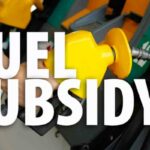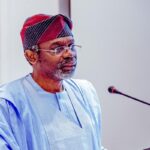In his inaugural address on Monday, President Bola Tinubu announced the end of fuel subsidy as it would no longer be an item on the budget. On Wednesday, government announced a drastic rise in the prices of petrol from N185 to up to N557 a litre depending on location. It was a shock to the nation and immediately, labour was up in arms demanding for a complete withdrawal.
The shock was due to expectations based on government announcements that palliatives would be negotiated and offered to poor Nigerians who would be impacted negatively by the new prices expected to come into effect in July this year.
By jumping the waiting period and announcing very high prices rather than talking in more coy language of deregulating the sector and alloying market forces dictate prices, the Tinubu administration is clearly signalling it’s going on war on the matter and it will use overwhelming force – shock and awe, to defeat the opposition, which is virtually all Nigerians. We Nigerians believe that our covenant with the State is based on the ruling class corruptly chopping our money, our patrimony and we the people are compensated with the crumbs of cheap fuel. That is why we have always fought the state with determination every time it has threatened to take our crumbs in the form of the cancellation of fuel subsidy.
The NLC and civil society are, I believe, ready for the fight. This time, however, yours sincerely would not be on the barricades. I believe that we have lost the battle which is based on getting our share of the rentier state because the Nigerian rentier state lost its battle for life under the Buhari presidency when petroleum rent dried up as criminals overthrew rentier bureaucrats.
NEWS EXTRA: Adamawa lawmaker opts for bicycle over Fuel price hike
Kidnapped Fulani leader’s son found dead in Kaduna forest
Going down memory lane, I still have fond memories of our last battle to save fuel subsidy in 2012. In Abuja, we decided to call the bluff of the Jonathan administration by establishing BLUF – Building Leverage and Unity on Fuel Subsidy Struggle. We were incensed by the decision of the Jonathan administration to cancel fuel subsidy because of the implications for extremely high costs for transport, food and other essentials. It was and remains a policy decision aimed at deepening poverty and the suffering of Nigerians.
We pointed out that the price of petroleum products had been adjusted 18 times in the 26 years since the military administration of General Babangida broke the mould by raising the pump price of petrol from 3.15 kobo per litre to 20 kobo per litre in April 1985. Throughout this period, while there have been regular increases in fuel prices, no government has succeeded in completely removing fuel subsidy.
The Jonathan administration, we contended, would also fail because Nigerians will struggle against it and win. We won. The result is that a cabal or regime insiders and marketers have stolen trillions of naira from our national treasury and as former Minister Ngozi Okonjo-Iweala explained, most of the subsidy we have been paying for is not even real fuel brought into the country, it’s simply looting of the treasury.
Part of what made us angry in 2023 was that the decision of President Jonathan to stop consultations with stakeholders, take a unilateral decision on the issue and then establish a negotiation body after implementing his unilateral decision. We believed that was very disrespectful to Nigerians who felt passionately about the issue. I do hope that the Tinubu administration would be willing to negotiate with stakeholders.
The key point in 2012 was that we were able to contest the arguments of the Jonathan administration that the fuel subsidy was unsustainable arguing that petroleum revenue inflows were sufficient to pay for the subsidy if corruption was controlled.
This time, the character of the State has changed significantly. Most petroleum produced in the country is simply stolen by cabals in charge of State administration and security. The Nigerian revenue flows have dried up and 96 per cent of what comes in is used to pay for debt servicing. This means that almost the totality of the N400 billion spent on fuel subsidy each month is borrowed. Allocations for health, education and social services have been largely abandoned to pay for fuel subsidy.
As at the end of 2022, Nigeria’s national debt was N25 trillion or $103 billion. With this unsustainable debt, we are mortgaging the future of our children and grandchildren. If we are foolish enough to continue along that path, the creditors are reading to tea leaves, that we cannot sustain the capacity to pay. This means we will soon reach where Sri Lanka got to of simply not having the ability to even borrow the cash to pay any more.
This Nigerian State is broken and cannot generate the rent to pay for what we and our four neighbouring countries have been enjoying in the form of very cheap petrol. Niger and Cameroon are petroleum exporting countries and deliberately set their petrol price at five times the cost of ours to encourage smuggling of Nigerian petrol for their consumers. We are the big brother and we have subsidised their transport and electricity systems for 50 years but unfortunately, we are broke today and cannot continue.
The NLC and civil society has to catch up in terms of its analysis of the Nigerian State. Does it make sense to borrow to pay subsidy and threaten our collective future with unpayable debt? Is cheap petrol more important to Nigerian citizens than health, education and social services which are being abandoned for a tunnel focus on cheap petrol?
Should NLC win the battle to save the fuel subsidy battle, what would be the implications of that “victory” for hastening the bankruptcy of the Nigerian State? These are the questions that led me to withdraw from my 45-year battle to sustain fuel subsidy in our beloved country.
My final frustration is on the consistent recommendation we have made over the decades that the Nigerian State should fix our four refineries to reduce or even eliminate our dependence on imported fuel. One person that agreed completely with us was a certain Muhammadu Buhari. In 2015, he became president, he was also minister of petroleum for eight years. He repeatedly gave contracts to fix the refineries. None of them are working. He owes Nigerians an explanation. Was the money once again simply stolen under his watch?

 Join Daily Trust WhatsApp Community For Quick Access To News and Happenings Around You.
Join Daily Trust WhatsApp Community For Quick Access To News and Happenings Around You.


